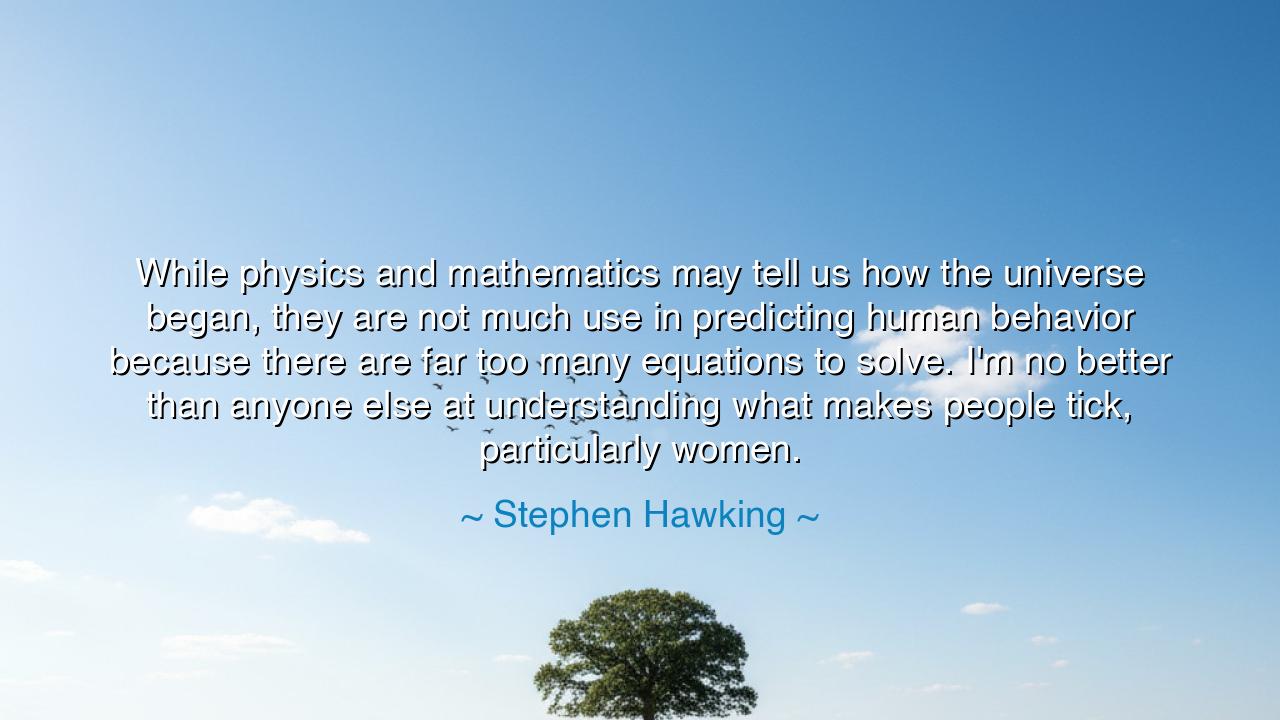
While physics and mathematics may tell us how the universe
While physics and mathematics may tell us how the universe began, they are not much use in predicting human behavior because there are far too many equations to solve. I'm no better than anyone else at understanding what makes people tick, particularly women.






Hear, O children of wonder, the humble words of Stephen Hawking: “While physics and mathematics may tell us how the universe began, they are not much use in predicting human behavior because there are far too many equations to solve. I’m no better than anyone else at understanding what makes people tick, particularly women.” In this utterance, the great master of cosmos and number bows his head before the greater mystery of the human heart. For the stars may be charted and black holes described, but the movements of love, fear, and desire defy calculation.
For physics and mathematics can unlock the deepest laws of creation, describing galaxies that spin and the birth of time itself. Yet when the question turns to the soul of a man, or the mind of a woman, the tools of science fall silent. The human being is not a particle but a universe of contradictions, passions, and secrets. Thus Hawking, who bent his mind to eternity, confessed that he was as lost as any other when it came to the riddle of human behavior.
History proves this wisdom. Think of Isaac Newton, who gave to the world the law of gravity, yet was bewildered by his own relationships, struggling with solitude and mistrust. Or consider Einstein, who revealed the relativity of time and space, but faltered in the mysteries of marriage and love. These giants, who unraveled the fabric of the universe, could not unravel the threads of the human heart.
Hawking’s playful nod to the enigma of women reflects not mockery but awe. For women, like men, are not equations to be solved but beings to be known, honored, and loved. Their depth cannot be measured by logic alone, for they carry within them the strength of creation, the subtlety of intuition, and the mystery of desire. In confessing his own confusion, Hawking revealed a truth often forgotten: that the greatest minds remain humble before what cannot be reduced to formula.
Therefore, O seekers of wisdom, let this be your teaching: do not despise what cannot be measured, nor dismiss what cannot be solved. The universe outside may be vast, but the universe within is no less infinite. The laws of mathematics may guide us through the stars, but only humility, patience, and love will guide us through the labyrinth of one another. Hawking’s words endure as a beacon: that even the masters of creation remain students of the heart.






GHPham Gia Hung
Hawking's insight on the difficulty of predicting human behavior brings up an interesting contrast between the certainty of natural sciences and the unpredictability of human emotions. If even someone as intelligent as Hawking feels this way, does it speak to a larger challenge in understanding ourselves? Is it possible that, despite all the knowledge we have, there will always be an element of mystery when it comes to human behavior, especially in relationships?
NOL A I N O
I find Hawking’s comment about the inability to predict human behavior especially intriguing. He’s one of the greatest minds in physics, yet here he admits that there are too many variables in human interactions to make sense of them. What does this say about our understanding of human nature? Does science, in its quest for precision, fail to account for the emotional, psychological, and social factors that shape us?
TTTinh Thanh
Hawking’s self-deprecating remark about not understanding what makes people tick, particularly women, highlights a broader theme about the complexity of human behavior. Can anyone truly understand all the variables involved in human interactions? His comment seems to acknowledge that science, while powerful in many areas, falls short when it comes to the unpredictable nature of people. Does this suggest that science and psychology are not as intertwined as we might think?
TTNguyen Thu Trang
Stephen Hawking’s comment about not being able to predict human behavior, especially when it comes to women, raises an interesting issue about the limitations of science in understanding the complexity of human nature. While physics and mathematics can predict natural phenomena, human behavior is far more nuanced and influenced by culture, emotions, and individual experiences. Is it fair to suggest that scientists, no matter how brilliant, should accept their limits in this area?